Traditional Scottish Shortbread
This post may contain affiliate links. See my disclosure policy.
This traditional Scottish Shortbread recipe creates those perfectly crumbly, irresistibly buttery, and wonderfully delicious shortbread biscuits that have been a year-round favorite treat for centuries. It’s made with just 3 staple ingredients but the flavor and texture is unforgettable!
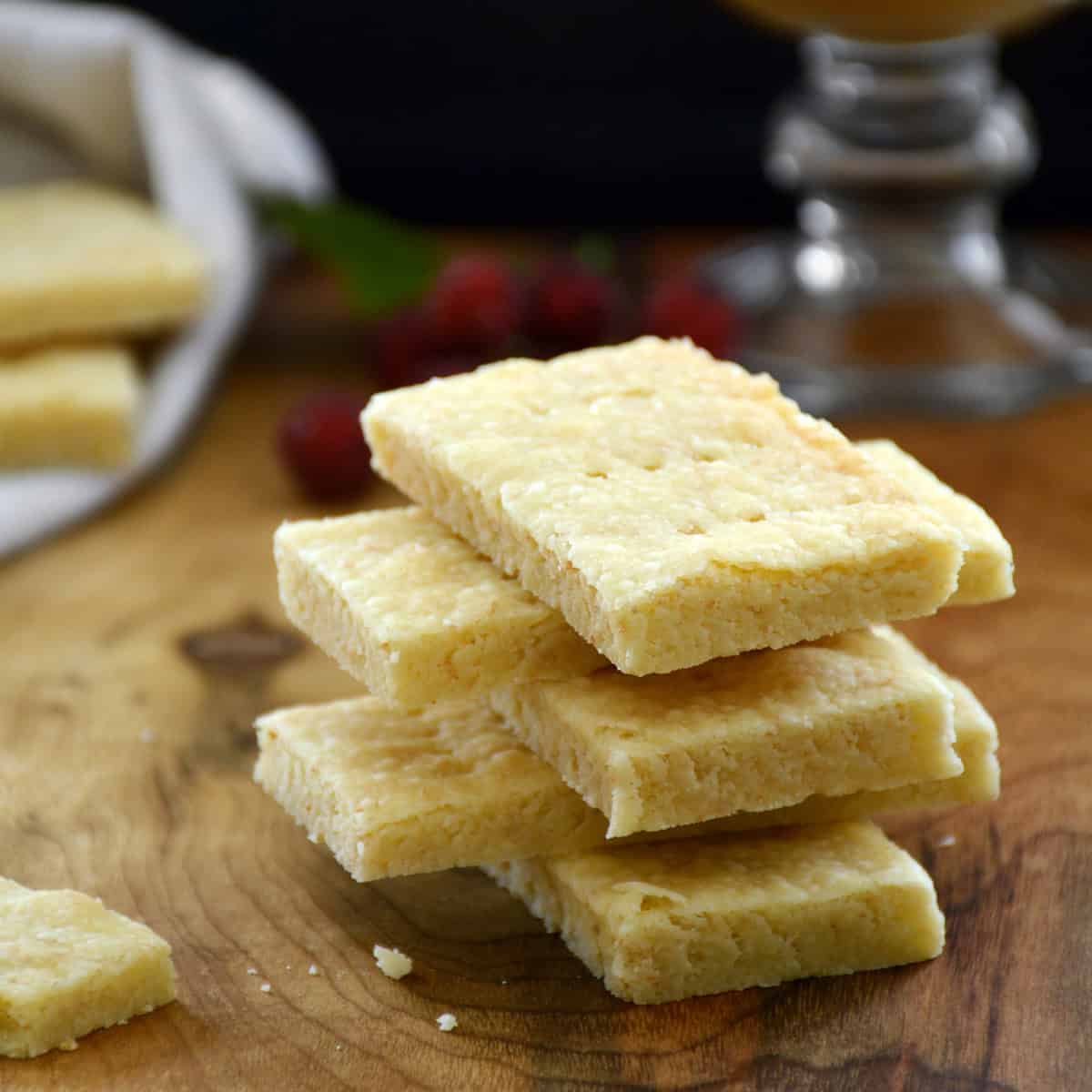
What is Shortbread?
Shortbread is as basic and simple as a cookie (biscuit) can get. But it’s also divinely delicious. And for that reason shortbread has been a favorite throughout the UK for hundreds of years.
The origin of shortbread goes back to somewhere around the 12th century when it was originally made from leftover bread-making dough that was left to dry out and harden into “biscuit bread.” Over time butter replaced the yeast and biscuit bread evolved into shortbread. The term “short” refers to the crumbly texture from the large quantity of butter. Butter was a luxury item and so shortbread was enjoyed only on special occasions and, of course, by the nobles and royals.

The more refined version of shortbread as we know it today is attributed to Scotland, in particular to Mary, Queen of Scots in the 16th century. She was particularly fond of what was known as Petticoat Tails, which was a thin shortbread baked in a large circle and cut into triangular segments. In her day the shortbread was commonly flavored with caraway seeds, which were all the rage in British baking for several centuries. In fact, the earliest published shortbread recipes from the 18th century were more elaborate than the standard shortbread today: They were baked with candied citrus peels and garnished with caraway comfits.
Traditionally Scottish shortbread is baked in either a rectangular or square slab and cut into fingers, as individual round biscuits, or in one large circle and cut into triangles. But you can cut them any shape you like and also use cookie stamps. I have these cookie stamps, these ones, and these ones and love them all – excellent quality.
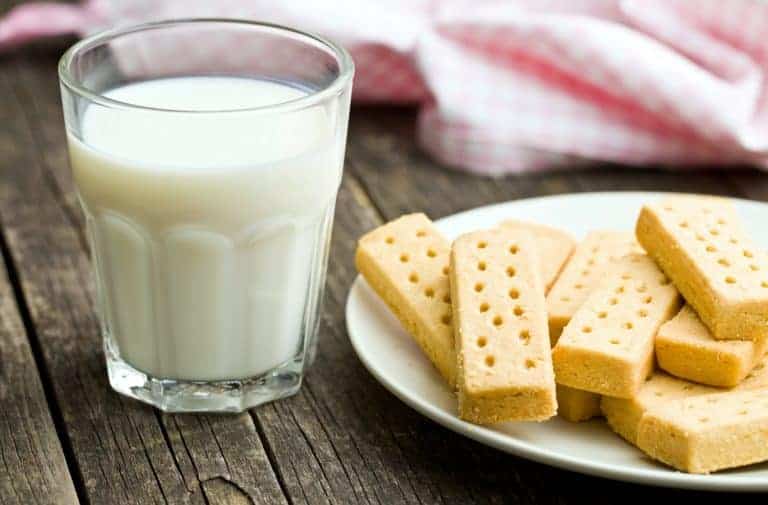
Scottish Shortbread Ingredients
We’re making Scottish shortbread the traditional way with just 3 ingredients: Flour, Sugar and Butter. Well, and a tiny pinch of salt, too. Nothing else is needed, no fancy ingredients, no flavor enhancers. The key to a good Scottish shortbread is the quality of the butter. That is what flavors the shortbread and the shortbread is only as good as the butter.
I’ve read a few claims that “traditional” Scottish shortbread is made with farola, which is a fine flour milled from durum wheat. But the oldest recipes I’ve researched do not, so this “tradition” may be a later/more contemporary one. Likewise some recipes call for powdered/confectioner’s sugar as well as rice flour; neither of these are traditional and should be avoided if you’re goal is to make authentic Scottish shortbread.
Another key to making Scottish shortbread is to use caster sugar. Not regular granulated sugar. Not powdered/confectioner’s sugar. Caster sugar is very fine granulated sugar. Caster sugar is commonly used in British baking and it’s an all-around smarter choice than granulated. The reason is that the sugar crystals in granulated sugar are much larger and take longer to dissolve during baking and may not dissolve completely. Caster sugar dissolves more rapidly leaving a finer texture to the baked good. You can buy caster sugar in the store or very simply make your own buy pulsing granulated sugar in a food processor or blender until it is ground more finely.

Scottish Shortbread Variations
In addition to the three base ingredients of flour, sugar and butter, there are a number of add-ins you can include to flavor your shortbread. Classic options include candied ginger, candied orange peel, dried cranberries or cherries, nuts, chocolate chunks, rosemary, lavender, and you can also dip or drizzle the shortbread biscuits with chocolate.

This Scottish Shortbread recipe is very simple and very easy to make and once you’ve made it yourself there will be no need to buy it again! Before we get started, if you want to take your shortbread to the next several flavor levels, try my traditional Scottish Millionaire’s Shortbread. With layers of shortbread, caramel and chocolate it is the ultimate indulgence! (Incidentally, it’s what my son requests every year for his birthday!)
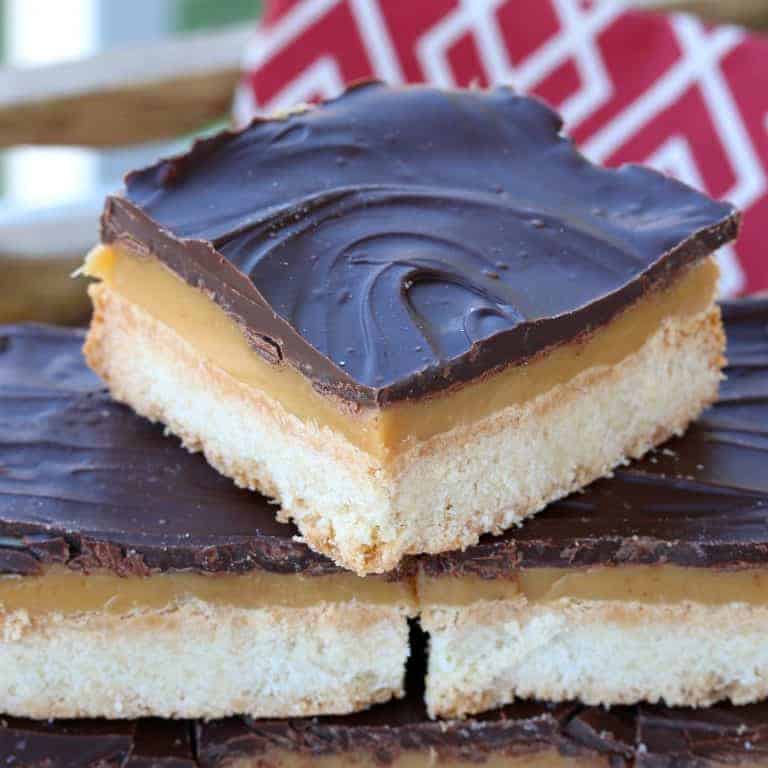
Scottish Shortbread Recipe
Let’s get started!
You can either buy caster sugar (it’s overpriced) or make you’re own, which is what I do. Super easy: Just put the sugar in a blender or coffee/spice grinder and pulse until it’s very fine.
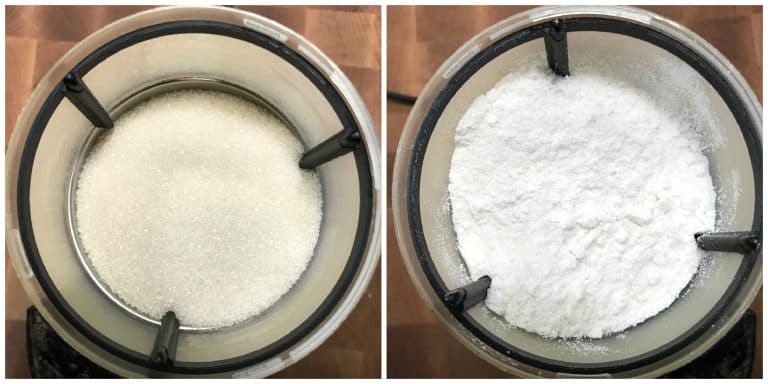
Place the flour, butter, caster sugar and salt in a food processor and pulse until it’s combined and looks like coarse breadcrumbs but is soft and pliable and comes together in a dough when you press it together between your fingers. If it’s too dry and crumbly it needs to be pulsed a bit longer.
At this point stir in any add-ins if using (candied ginger, candied citrus peel, herbs, nuts, etc.)
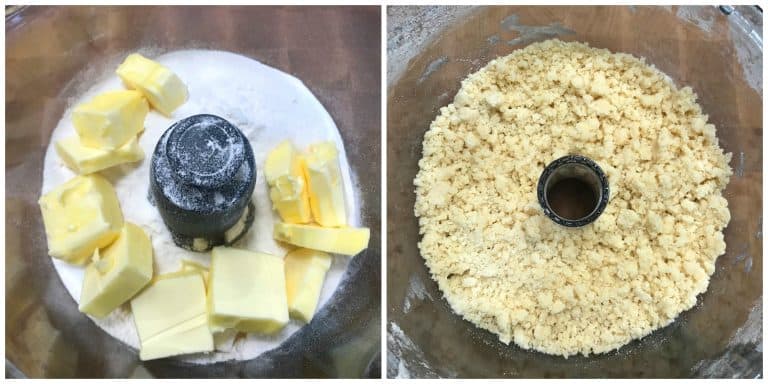
Pour the mixture into a greased 8×8 inch (shortbread roughly 3/4 inch thick) or a 9×9 inch (shortbread about 1/2 inch thick) baking pan. You can also use a round cake pan. Use your fingers and hands to firmly press down the mixture.
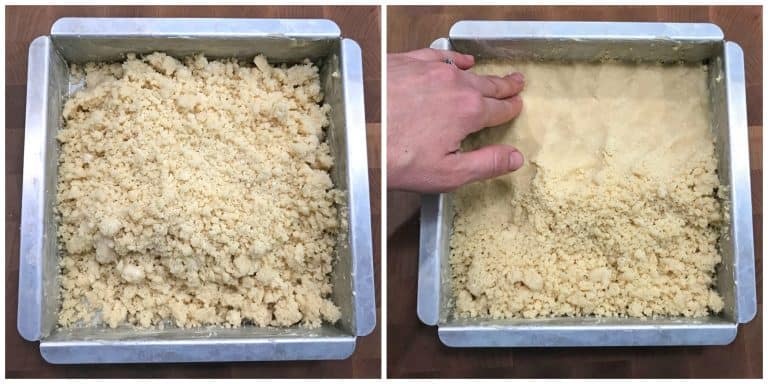
Prick the shortbread with the tines of a fork, creating rows. You can also run a knife between each row of fork tines to make cutting the shortbread easier after it’s baked. Another option is to prick the shortbread with a fork immediately after it is done baking while it is still warm; this way the holes will be more pronounced as they have a tendency to close during baking.
Preheat the oven to 350 degrees F. Place the shortbread on the middle rack and bake for 30-35 minutes or until light golden and firm. Remove from oven and sprinkle lightly with caster sugar or granulated sugar. Let cool. Cut and serve.
Store the shortbread in an airtight container for up to several weeks. Its flavor and texture improves over time.
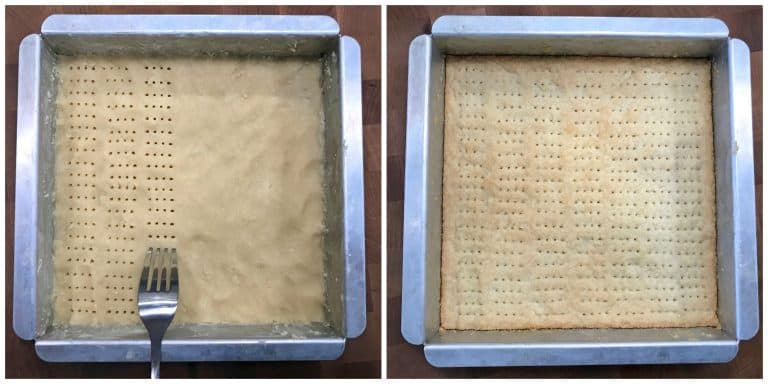
Storage Tips
Shortbread has a low moisture content and so it does best when it’s stored in an airtight container. Cool, dry conditions are optimal to enable the shortbread to retain some crisp without becoming stale. Stored this way it will keep for a few weeks. If you plan on keeping it longer it can also be frozen. To do that, place some parchment paper between the shortbread biscuits to prevent them from sticking to each other. Freeze them in freezer containers or ziplock freezer bags and let them thaw at room temp when you’re ready to eat them. They can be frozen for up to 3 months.
Enjoy!
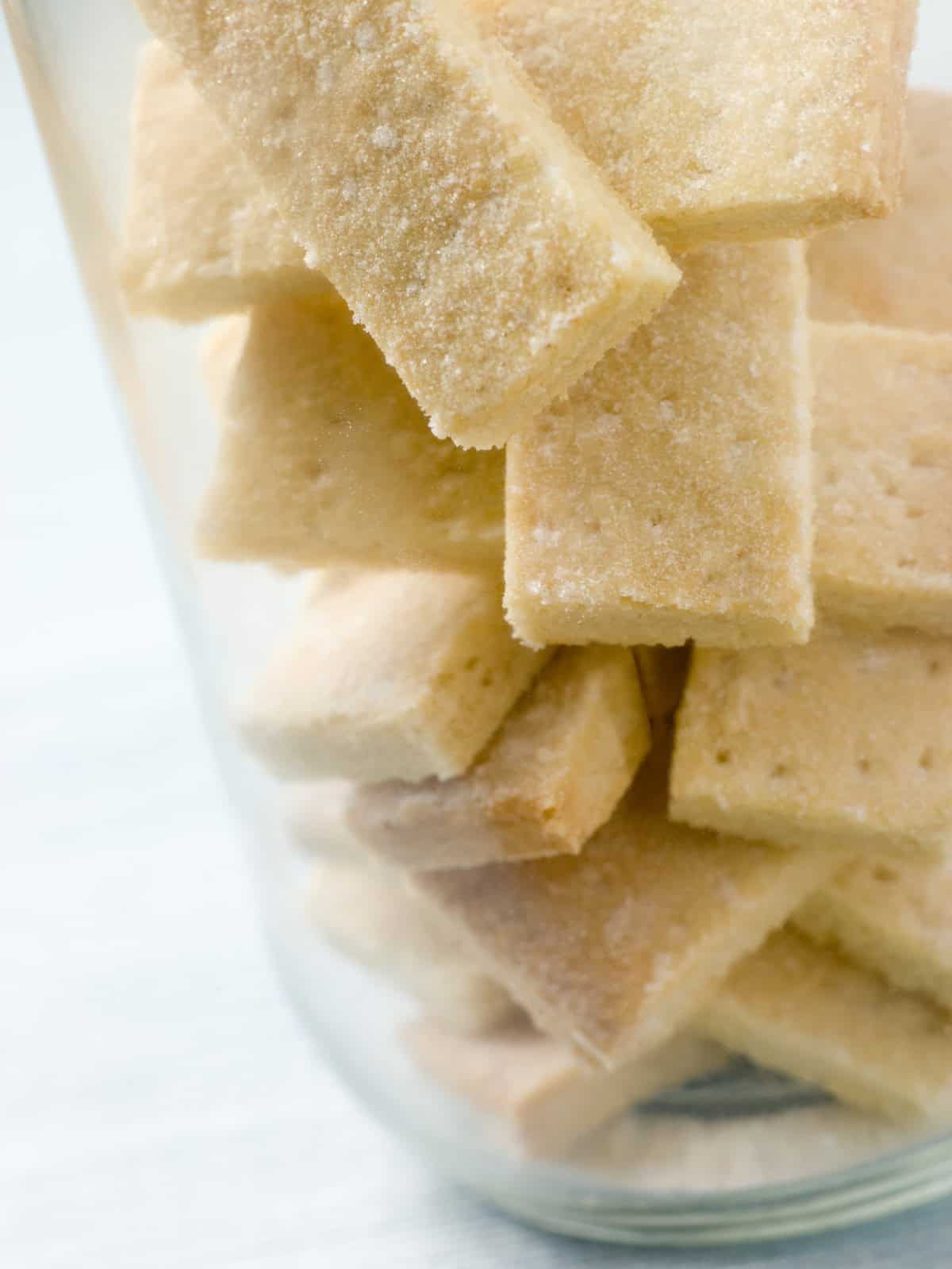
For more traditional British treats try my:
- Treacle Tart
- Sticky Toffee Pudding
- Spotted Dick
- Chelsea Buns
- Lardy Cake
- Eccles Cakes
- Chelsea Buns
- Cornish Fairings
- Hot Cross Buns
- Easter Biscuits
- Parkin
- Bara Brith
- Barmbrack
- Mincemeat
- Mince Pies
- Victoria Sponge Cake
Save This Recipe
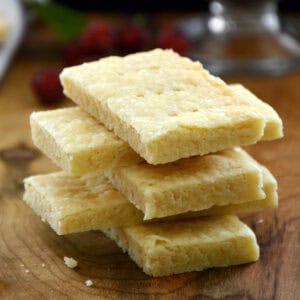
Traditional Scottish Shortbread
Equipment
- Cookie stamps (optional)
Ingredients
- 2 1/2 cups all-purpose flour
- 1 cup quality unsalted butter , cubed and softened at room temperature (the better the butter, the better the shortbread)
- 1/2 cup caster sugar , or "baker's sugar" in the U.S. (if you can't find it simply pulse granulated sugar in a blender until very fine. Do NOT use powdered sugar)
- 1/2 teaspoon salt
- Optional Add-Ins:
- Homemade Candied Ginger (click link for recipe)
- Homemade Candied Citrus Peel (click link for recipe)
- Other options include nuts, fresh herbs, dried cranberries, etc.
Instructions
- Preheat the oven to 350 degrees F. Butter a 8×8 or 9×9 inch square baking pan. You can also use a round cake can and cut the shortbread into triangles.
- Place the flour, butter, caster sugar and salt in a food processor and pulse until it's combined and looks like coarse breadcrumbs but is soft and pliable and comes together in a dough when you press it together between your fingers. If it's too dry and crumbly it needs to be pulsed a bit longer. (If using any add-ins, stir them in at this point.)Pour the mixture into the greased baking pan. Use your fingers and hands to firmly press down the mixture. Note: If the mixture is too dry to work with, including pricking with a fork (see below), then it was not pulsed long enough in the food processor. Prick the shortbread with the tines of a fork, creating rows. You can also like run a knife between each row of fork tines to make cutting the shortbread easier after it's baked. Another option is to prick the shortbread with a fork immediately after it is done baking while it is still warm; this way the holes will be more pronounced as they have a tendency to close during baking.
- Place the shortbread on the middle rack and bake for 30-35 minutes or until light golden and firm. Remove from the oven and sprinkle lightly with caster sugar or granulated sugar. Let cool. Cut and serve.Store the shortbread in an airtight container in a cool place (not the fridge) for up to several weeks. Its flavor and texture improves over time.
Nutrition
Originally published on The Daring Gourmet March 10, 2019



















Excellent- finally found the recipe to replace the one from my mother. It vanished after she died and I’ve been searching for years.
Can you freeze the dough?
Hi Linda, the baked shortbread, yes. As for the raw dough, theoretically you should be able to, yes, but I can’t speak from experience.
I made this recipe tonight and it came out Amazing!!! ❤ I followed the exact recipe however I did used a smaller food processor so i just processed the ingredients in two and mixed in a large bowl before putting mixture into my 8×8 buttered pan. I did score with fork and knife although it baked out but i did it again while warm right out of the oven. I have an Electric oven so it was approximately 35 to 38 min to bake. I’m bringing it to my sister’s for Thanksgiving and I think my British Brother in Law will be impressed. Also i used Kerry’s Gold Irish Unsalted butter which is so yummy. I will make another batch tomorrow with another European style butter as i think that makes all the difference. I’m so happy i found this easy breezy recipe Thank you! I too look forward to visiting Scotland in the next year or so. 🏴
Fantastic, Cheryl, I’m thrilled that you enjoyed it, thank you! I agree with you 100% about the butter; quality butter makes all the difference. For a truly decadent shortbread experience you should try the Millionaire’s Shortbread as well!
Yes i will be trying the Millionaire’s shortbread for Christmas as gifts! Tonight for my second batch I’m going to try the Candied Ginger or Candied orange as i haven’t decided yet. How much add in should be measured to the recipe? Thank you again! ❤
I have a question….could I substitute the castor sugar with honey (I usually use “old” honey for baking, i.e. 3 years and older which has crystalized but of course still is moist) and if the answer is in the affirmative, how much for this recipe?
Hi Angela, you would need to substitute the castor sugar with another dry sweetener. The liquid honey will throw the consistency off and you’ll have a wet messy dough.
Thank’s for the hack Kimberley. So I’ll just use raw organic cane sugar and turn it into “castor sugar” consistency in my mixer
Great, simple recipe! I also ground up candied lemon and orange slices that I bought in Rome at the Fiori Market. (About 1/3 cup). Deliciozo!
Perfect, Lindsay, thanks so much for the feedback!
Excellent shortbread! I love that it comes together in a food processor. My kitchen is cold, so the butter was about 62 degrees. I cubed the butter as directed and processed until the dough hung together, and it worked like a charm. I followed the suggestion to use a plastic wrap cover when pressing the dough into the pan, which worked great, I used superfine sugar, added 3/4 tsp. ground cinnamon because I love cinnamon. I baked it 30 minutes in a 9×9 pan. Though it was golden brown, it was still a touch undone, so next time I’ll bake it 35 minutes.
Fantastic, Denverbaker, thanks so much!
I make this recipe all the time now,I have got adventurous and add a layer of homemade fig jam in the middle with a generous shortbread topping and is absolutely fab,some in baking now,next time I’m going to add homemade stem ginger chopped into to the shortbread yummy. Than you .
That’s terrific, Fran, thanks for the feedback! It’s going to be fabulous with the candied ginger!
Hello Kimberly,
My grandmother came to America in the late 1800s for the first time from Scotland. She always taught me that the Scottish Shortbread was made of equal parts of Flour, Sugar and Butter. Of course, they weighed their ingredients in those days.
I don’t understand the difficulty some of the folks are having with your recipe. It is terrific.
Thank you, Lee! It’s essential to get the consistency right when mixing the shortbread dough which just takes a little attention and for anyone who’s never made it before it can be hard to know what to expect. It’s well worth it to get it right though because Scottish shortbread is an absolute joy!
Really easy and really tasty. If using the 8×8 pan be sure to let it bake long enough or the shortbread will not be crisp. I ahve made shortbread before but mixing it in a food processor made it so quick. I especially appreciate the hint at making homemade caster surgar…it made a nice difference in the final product. Almost as good as some of the homemade bread we had during our time in Scotland.
Awesome, Michelle, I’m so glad you enjoyed it, thank you!
No one in Scotland would ever add ginger or citrus peel to shortbread.
Well that’s just not correct, Mike, because I have bought both ginger and citrus peel shortbread in Scotland on multiple occasions.
Well Mike, I’m from Scotland, and I’m just about to try this exact recipe with some added rose petals and vanilla bean extract… Not sure how that’s any different really.
Recipes are not always meant to be followed to the letter, cooking is an art, not a science; unless you’re talking about ingredients that need to be together in specific quantities to achieve a certain texture (like plain flour and bicarb to get self raising), and even then, there’s some movement. If everyone followed recipes to the letter, there would be no innovation and food would be boring.
Correction to my last comment:
I realized that in my feedback I keep saying biscuit, but I meant shortbread (I realized that this might be confusing for people in the USA since a biscuit in something else oops!)… it’s the way it translates in my head from French, my apologies!
Again, thank you for the recipe!
It is not easy to make shortbread cookies, scones, etc… and this recipe is very good. I personally use my hands when mixing, and keep in mind that the butter MUST be room temperature and cubed. If you failed at this recipe, just try again, because there is no fault in it. Also, these recipes, as easy as they seem, call for extreme patience. When I make them, I line the pan with parchment paper so that it is easy to take them out of the pan, and I pre-cut then before baking so that it is easier to cut once they are done. As someone who has travelled to Scotland (and the UK in general many times), the recipe is on point. It is also not the first time I have seen this specific recipe (a popular local pâtisserie here uses this same recipe). If you expected something else out of the recipe, then hate to break it to you, but you probably weren’t thinking of the same treat (the scones and biscuits made in North America are NOT the same… :/)
I made this recipe for a party (took the chance and didn’t even test them out prior lol) and people loved them :)… I only told them they were homemade after they started asking me where I got them from. I wish I could add photos of the process and finished product, but it doesn’t seem like I can.
Anyways, if you get this recipe wrong, you are doing something wrong.. or it could even be that the butter you are using is not quality, your oven is weak… again these types of treats are NOT easy to make, so if you have made them in the past with a different recipe and found them easy to make…. you probably weren’t making scottish biscuits..
Thank you for the recipe, love it :)
Thanks so much for the detailed insights and feedback, Desi! Yes, you are correct on every point :)
Disappointed I didn’t read the comments before trying the recipe. Looking at Google conversions of sticks of butter to grams,that may be the issue. Compared to other recipes, this one has double the amount of butter.
1 stick is half a cup of butter, and this recipe calls for 2 sticks…so therefore, its one cup. I cant imagine a shortbread recipe with less butter. It would not be shortbread!
To the people who have complained that the recipe doesn’t work, I’m sorry but the fault lies with YOU. You are doing something wrong. Possibly you aren’t letting your butter soften sufficiently, or you aren’t processing the mixture long enough. It HAS to start clumping together in the processor or it will be too dry to work with. Then it must be pressed rather firmly into the lightly buttered pan. (Use the residue on the butter wrapper to butter the pan.) I usually don’t bother pricking with a fork. It isn’t necessary. Also, if you use salted butter, then you don’t need to add additional salt.
I’ve made this exact recipe numerous times in my food processor, and it NEVER fails. It comes together very quickly and can be embellished in any number of ways. I like to pulse chopped walnuts with the sugar until finely ground, and then I often drizzle the cooked and cooled shortbread with melted chocolate thinned with a little heavy cream. Along with a cup of tea or coffee, it’s a great go-to for guests.
Thanks so much for the feedback, Shary, I’m happy you’ve made multiple successful batches!
Total fail of the recipe…i got 1 misshaped huge pile of baked dough, not even similar to shortbread.. would give it 0 stars if possible..